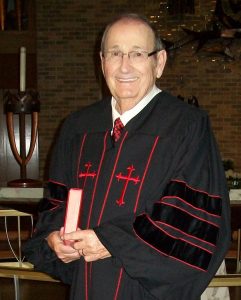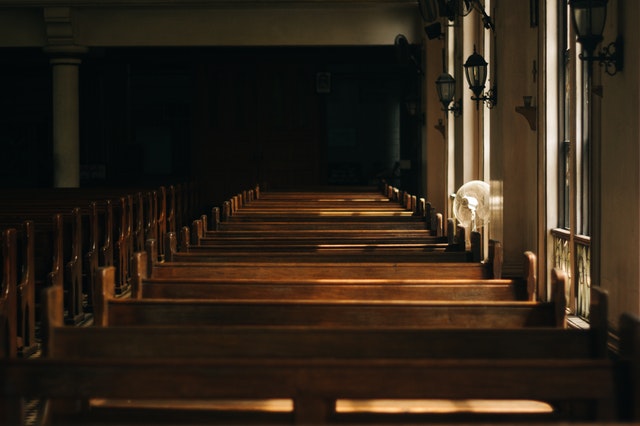
“I don’t believe in organized religion,” the man said. A soft voice spoke up, “Well, you need to come to my church because we’re not organized at all.”
What does the man mean, anyway? Does he not like hearing someone deliver a sermon? Or maybe he doesn’t enjoy music or congregational singing. Or perhaps it’s the way ushers “ush”. Or putting money in an offering plate. Or outreach missions to the less fortunate. Critics say we’re too lazy to attend church on Sunday and that we like sports better than church. And that we are so narcissistic that we are more interested in getting our own needs met than in meeting the needs of our community or the world. Also, many turn away from church because of strict legalism. I met a young lady just recently who was told by her religious leader that she was going to hell because of her past choices. I don’t believe anyone has the right to tell another that they are going to hell. Jesus said, “Just not that you not be judged” (Matthew 7:1). Dogmatic fundamentalism has done much damage to religion. Unhealthy religion is much too common.
What is dogmatic fundamentalism? It’s the belief that you have the only legitimate road to God or to Heaven. It is saying that you have to jump through my theological hoop to be saved. Also, it is the literal interpretation of the Scriptures. Jesus called the Pharisees (the religious people of his day) hypocrites because they were so legalistic. The church should be in the helping business and not the judging business. Legalism is the opposite of God’s Grace.
What’s the Grace of God? Grace is the “unmerited, undeserved, unconditional love of God.” “While we were yet sinners, Christ died for us” (Romans 5:8). God loves us anyway. The best illustration to me is the story of the Prodigal Son’s father, who said to his wayward son when he came home, “Let’s have a party” (See Luke 15).
Define religion. It is the way we express our faith. It covers a broad spectrum of belief systems. Religion can be a healthy way of expressing beliefs or it can be the very opposite. “But let us remember that each of us, religious or spiritual, have come short of the glory of God (see Romans 3:23). We are imperfect vessels.
Give an example of unhealthy religion. The Reverend Dr. Fred Craddock tells about the time he was to preach in a certain church and a sixteen-year-old girl asked him when he arrived, “While you are here, are you going to preach on Heaven and hell and judgment and stuff?” “I hadn’t planned to,” he answered. Then, she asked him another question: “Will I go to hell for not wanting to go to Heaven?” Then she said, “Well, my mother doesn’t understand that I don’t want to go to Heaven. She is always asking me questions when I go out, and saying, ‘If you do this or if you do that, you won’t go to Heaven.’” Dr. Craddock went on to try to assure her what faith in God is all about, and that is “to love”, not “fear”. Hopefully this teenager will one day claim her spiritual connection to God, even if she turns away from organized religion.
What is spirituality? Everyone is basically spiritual. The thing that makes you, you, is not your hair, eyes or brain, etc. It is your spirit, your personality, your lifestyle. We can’t help being spiritual. Your spirit can be positive or negative. Your spirit can touch the lives of other people for good or evil. There is a spirit of “hatred” in our country now that we hope will disappear before it does more damage to different races and religions. To have a suspicious spirit about people who are different colors or beliefs is a toxic spirit. It gives birth to violence. Which of the following words describe your spirit: generous, greedy, loving, hateful, fearful, worried, encouraging, suspicious, unforgiving, forgiving, racist, cooperative, joyful, Christ-like? I could name more, but you get the message.
What are the benefits or positive things about organized religion? A lot of folks simply don’t know what churches do. Our world would be in worse shape than it is without the institutional benefits. My office was in the Methodist Children’s Home in Ruston when I was a district superintendent. I was amazed at the way they ministered to abused and abandoned kids. Consider this: Centenary College, Duke University, Emory University, SMU, Baylor, Salvation Army and many more great institutions would not exist without organized religion. My youngest son, Chris, is the CEO of the Wilson Foundation which funds the Methodist Rehab hospital in Jackson, Mississippi. He gave me a tour one day and I saw young men whose bodies had been broken in various ways, paralyzed from sports and other activities, many of whom were using modern technology to move around. The rehab hospital would not exist without organized religion.
When I was in seminary, I had to study the writings of Paul Tillich. His main thesis was, “God is the Ground of our being.” I didn’t’ know exactly what he had in mind, but recently I found a clear interpretation of the book by Diana Butler Bass: “God is the ground, the grounding that which grounds us. We experience this when we understand that soil is holy, water gives life, the sky opens our imagination, our roots matter, home is a divine place and our lives are linked with our neighbors and those around the globe. The world, not Heaven, is the sacred stage of our times” (Grounded, a Spiritual Revolution, page 26).
Now, if we can get those who claim to be spiritual into the Church, what a revolution that would be! There are wonderful moments when spirituality makes it into the church. So, instead of spirituality vs. organized religion, it would be spirituality and organized religion. Amen.
Dear Lord, help us to work toward the union of spirituality with organized religion so that our institutions will become more dynamic and effective in reaching people. Amen.










